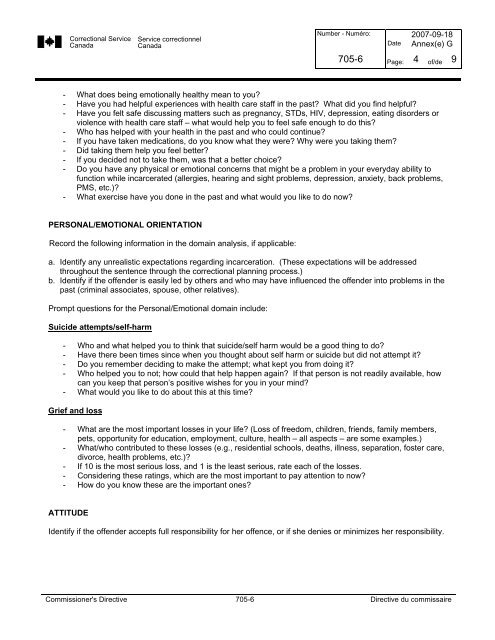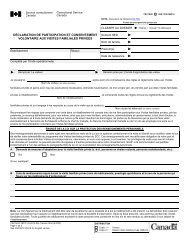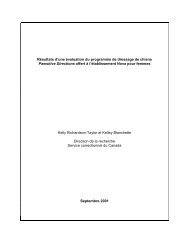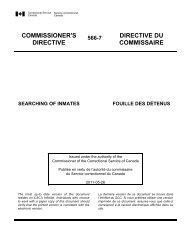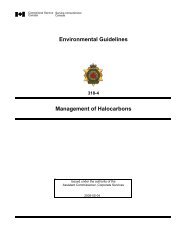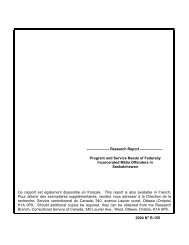CD 705-6 - Correctional Planning and Criminal Profile - Service ...
CD 705-6 - Correctional Planning and Criminal Profile - Service ...
CD 705-6 - Correctional Planning and Criminal Profile - Service ...
You also want an ePaper? Increase the reach of your titles
YUMPU automatically turns print PDFs into web optimized ePapers that Google loves.
<strong>Correctional</strong> <strong>Service</strong> <strong>Service</strong> correctionnel<br />
Canada Canada<br />
Number - Numéro: 2007-09-18<br />
Date Annex(e) G<br />
<strong>705</strong>-6 Page: 4 of/de 9<br />
- What does being emotionally healthy mean to you?<br />
- Have you had helpful experiences with health care staff in the past? What did you find helpful?<br />
- Have you felt safe discussing matters such as pregnancy, STDs, HIV, depression, eating disorders or<br />
violence with health care staff – what would help you to feel safe enough to do this?<br />
- Who has helped with your health in the past <strong>and</strong> who could continue?<br />
- If you have taken medications, do you know what they were? Why were you taking them?<br />
- Did taking them help you feel better?<br />
- If you decided not to take them, was that a better choice?<br />
- Do you have any physical or emotional concerns that might be a problem in your everyday ability to<br />
function while incarcerated (allergies, hearing <strong>and</strong> sight problems, depression, anxiety, back problems,<br />
PMS, etc.)?<br />
- What exercise have you done in the past <strong>and</strong> what would you like to do now?<br />
PERSONAL/EMOTIONAL ORIENTATION<br />
Record the following information in the domain analysis, if applicable:<br />
a. Identify any unrealistic expectations regarding incarceration. (These expectations will be addressed<br />
throughout the sentence through the correctional planning process.)<br />
b. Identify if the offender is easily led by others <strong>and</strong> who may have influenced the offender into problems in the<br />
past (criminal associates, spouse, other relatives).<br />
Prompt questions for the Personal/Emotional domain include:<br />
Suicide attempts/self-harm<br />
- Who <strong>and</strong> what helped you to think that suicide/self harm would be a good thing to do?<br />
- Have there been times since when you thought about self harm or suicide but did not attempt it?<br />
- Do you remember deciding to make the attempt; what kept you from doing it?<br />
- Who helped you to not; how could that help happen again? If that person is not readily available, how<br />
can you keep that person’s positive wishes for you in your mind?<br />
- What would you like to do about this at this time?<br />
Grief <strong>and</strong> loss<br />
- What are the most important losses in your life? (Loss of freedom, children, friends, family members,<br />
pets, opportunity for education, employment, culture, health – all aspects – are some examples.)<br />
- What/who contributed to these losses (e.g., residential schools, deaths, illness, separation, foster care,<br />
divorce, health problems, etc.)?<br />
- If 10 is the most serious loss, <strong>and</strong> 1 is the least serious, rate each of the losses.<br />
- Considering these ratings, which are the most important to pay attention to now?<br />
- How do you know these are the important ones?<br />
ATTITUDE<br />
Identify if the offender accepts full responsibility for her offence, or if she denies or minimizes her responsibility.<br />
Commissioner's Directive <strong>705</strong>-6 Directive du commissaire


